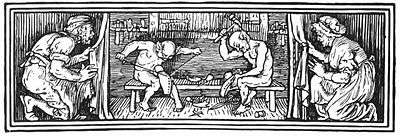The Elves and the Shoemaker

"The Elves and the Shoemaker" is an often copied and re-made 1806 story about a poor shoemaker who receives much-needed help from elves.
The original story is the first of three fairy tales, contained as entry 39 in the German Grimm's Fairy Tales under the common title "Die Wichtelmänner". In her translation of 1884 Margaret Hunt chose The Elves as title for these three stories.[1]
The Aarne–Thompson folklore classification system categorizes the story as type 503*: Helpful Elves [2] and also as a migratory legend, type 7015.[3]
Plot summary
There are variations depending on the rendition of the story.
- A poor shoemaker and his wife need money to pay the rent. He gives away the last pair of shoes he has to a needy lady. He has leather to make one more pair of shoes. He cuts out the pieces of leather, before going to bed, so that he can sew them into a pair of shoes on the morrow. Elves come in the night and make the pair of shoes which he sells for more than his asking price the next day. He uses that money to pay the rent, buy food and more shoe leather. He feeds a poor traveler.
- He has just enough money to buy enough leather for two pairs of shoes. He cuts the pieces of leather for two pairs, and retires for the night. The elves come, again, that night and make two pairs of shoes with the additional leather. He gives away one pair to a needy person and sells the other pair to a referral from the first customer who is immensely satisfied.
- He buys leather for three and stays up to find the elves making the shoes. The shoemaker and wife make clothes for the elves the next day, but the elves are freed when given clothes, so they leave, and the shoemaker and his wife never see them again.
In popular culture
Friz Freleng created a musical adaption of the story for his 1946 Merrie Melodies cartoon Holiday for Shoestrings.
Four years later, Tex Avery adapted the story for his 1950 MGM cartoon short The Peachy Cobbler.
The 1956 Looney Tunes cartoon short Yankee Dood It is based on this fairy tale, with Elmer Fudd as the king of industrial elves. 150 years after this fairy tale took place, he visits the shoemaker to retrieve the elves he has employed, while also imparting the virtues of mass production capitalism to him. The same basic plot was also used in the 1946 cartoon short Holiday for Shoestrings.
In the Due South episode, "The Deal", Det. Ray Vecchio vaguely recollects this story when discussing a poor cobbler with his partner, Constable Fraser.
In Cinderella: From Fabletown with Love, a spinoff miniseries of the Vertigo comic-book series Fables, the shoemaker appears as an employee in Cinderella's shoe store, while the elves are the builders and suppliers of the store's inventory.
Muppet Classic Theater had a version where a shoemaker (played by Kermit the Frog) faces ruin until his livelihood is saved by a group of philanthropic entertainers (played by The Elvises) who, naturally, make only blue suede shoes.
In a Barney & Friends episode called If the Shoe Fits..., the kids are rehearsing for their play about this story.
In the Harry Potter series of books, there are a large number of House Elves. These elves take care of the needs of human wizards. They are also free of their obligation once given clothes.
In the TV show Supernatural, the season 6 episode Clap Your Hands If You Believe has a variation of the tale, of a watchmaker and some fairies.
In Jane Shields and Rosemary Doyle's The Shoemaker and the Pantomimes Cinderella goes looking for elves to help her father in his obligation to the evil designer Kenneth Coal, but all she ends up with are Mimes, a resourceful mother Twanky, and an even more resourceful cat. Premiered Red Sandcastle Theatre, Toronto, 2012.
The fairytale is alluded to in two episodes of The Big Bang Theory. In The Extract Obliteration, Leonard Hofstadter mentions it to Penny after he does her essay for her. In The Bus Pants Utilization, Sheldon greets Leonard in the morning with "Good morning, Shoemaker", in reference to the fact that he has been up all night working on Leonard's differential equations app project.
In the 2003 Christmas movie Elf, shoe making is one of the jobs for elves.
See also
References
External links

